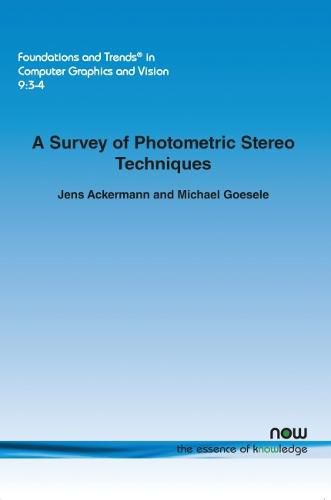Readings Newsletter
Become a Readings Member to make your shopping experience even easier.
Sign in or sign up for free!
You’re not far away from qualifying for FREE standard shipping within Australia
You’ve qualified for FREE standard shipping within Australia
The cart is loading…






This title is printed to order. This book may have been self-published. If so, we cannot guarantee the quality of the content. In the main most books will have gone through the editing process however some may not. We therefore suggest that you be aware of this before ordering this book. If in doubt check either the author or publisher’s details as we are unable to accept any returns unless they are faulty. Please contact us if you have any questions.
Reconstructing the shape of an object from images is an important problem in computer vision that has led to a variety of solution strategies. This monograph focuses on photometric stereo, that is, techniques that exploit the observed intensity variations caused by illumination changes to recover the orientation of the surface. In the most basic setting, a diffuse surface is illuminated from at least three directions and captured with a static camera. Under some conditions, this allows to recover per-pixel surface normals.
Modern approaches generalize photometric stereo in various ways; for example, relaxing constraints on lighting, surface reflectance and camera placement, or creating different types of local surface estimates. Starting with an introduction for readers unfamiliar with the subject, A Survey of Photometric Stereo Techniques discusses the foundations of this field of research. It then summarizes important trends and developments that have emerged in the last three decades. The focus is on approaches with the potential to be applied in a broad range of scenarios. This implies, for example, simple capture setups, relaxed model assumptions, and increased robustness requirements.
This is an ideal reference for anyone looking for an understanding of the diverse concepts and ideas around this topic and how we can move towards more general techniques than traditional photometric stereo.
$9.00 standard shipping within Australia
FREE standard shipping within Australia for orders over $100.00
Express & International shipping calculated at checkout
This title is printed to order. This book may have been self-published. If so, we cannot guarantee the quality of the content. In the main most books will have gone through the editing process however some may not. We therefore suggest that you be aware of this before ordering this book. If in doubt check either the author or publisher’s details as we are unable to accept any returns unless they are faulty. Please contact us if you have any questions.
Reconstructing the shape of an object from images is an important problem in computer vision that has led to a variety of solution strategies. This monograph focuses on photometric stereo, that is, techniques that exploit the observed intensity variations caused by illumination changes to recover the orientation of the surface. In the most basic setting, a diffuse surface is illuminated from at least three directions and captured with a static camera. Under some conditions, this allows to recover per-pixel surface normals.
Modern approaches generalize photometric stereo in various ways; for example, relaxing constraints on lighting, surface reflectance and camera placement, or creating different types of local surface estimates. Starting with an introduction for readers unfamiliar with the subject, A Survey of Photometric Stereo Techniques discusses the foundations of this field of research. It then summarizes important trends and developments that have emerged in the last three decades. The focus is on approaches with the potential to be applied in a broad range of scenarios. This implies, for example, simple capture setups, relaxed model assumptions, and increased robustness requirements.
This is an ideal reference for anyone looking for an understanding of the diverse concepts and ideas around this topic and how we can move towards more general techniques than traditional photometric stereo.